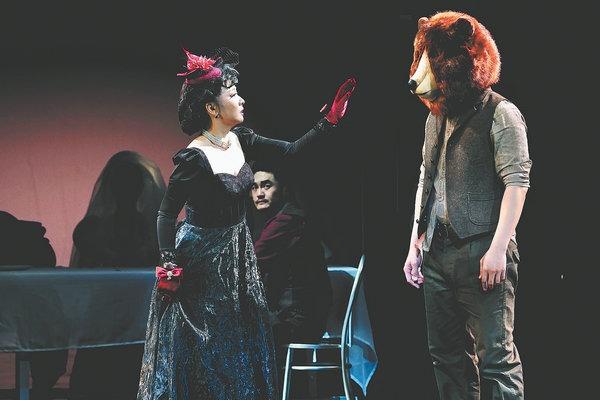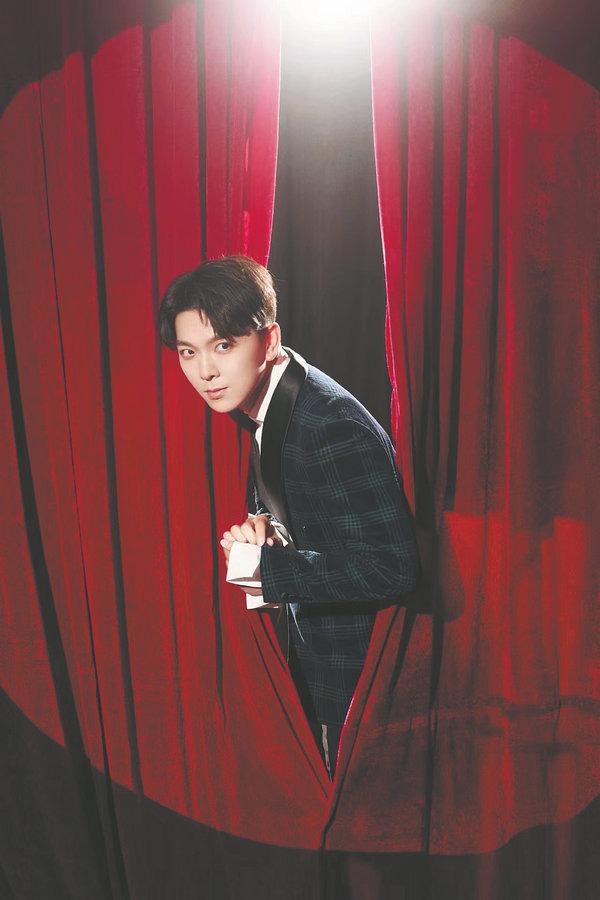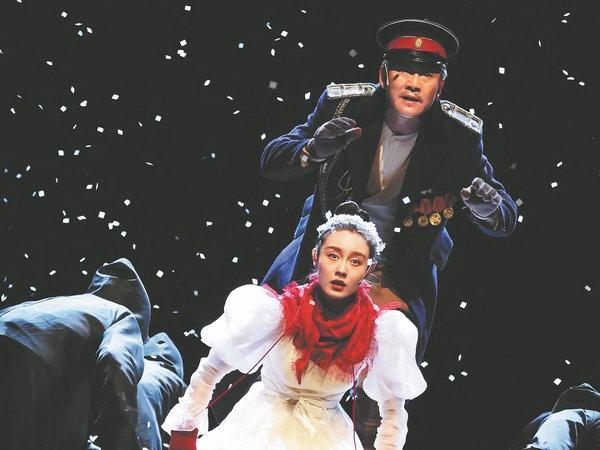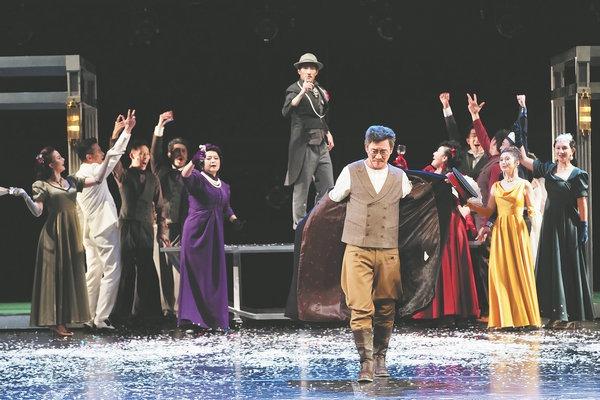 A scene from the Chinese play, Love, Chekhov, which is based on three of the Russian writer's comedies — The Bear, The Proposal and The Wedding. (PROVIDED TO CHINA DAILY)
A scene from the Chinese play, Love, Chekhov, which is based on three of the Russian writer's comedies — The Bear, The Proposal and The Wedding. (PROVIDED TO CHINA DAILY)
One of Zha Wenhao's favorite writers is Russian storyteller Anton Chekhov (1860-1904).
Since Zha was a student at the Central Academy of Drama, the actor-turned-director has enjoyed reading Chekhov's works, from his full-length plays, such as The Seagull and The Cherry Orchard, to his short, one-act comedies, like The Proposal.
Now, as a director with the National Theatre of China, Zha is busy restaging a Chinese play, titled Love, Chekhov, which is based on three of the writer's comedies — The Bear, The Proposal and The Wedding — and will be staged at the company's theater from Wednesday to Sunday.
The play features veteran actors and actresses from the company, including Hou Yansong, who performs multiple roles, Chang Yuhong and Jiang Jiaqi.
"When I read the romantic stories told in Chekhov's works, I couldn't help wondering what Chekhov's attitude toward love and marriage was and how he dealt with romantic relationships," says Zha. "When I read his works in my 20s, and now again in my 30s, I feel different about those stories. I want to share my understanding about the writer and his works about love, relationships and marriage with the audience."
Zha adds that the restaging of Love, Chekhov will once again explore individuals seeking out and struggling for happiness and love.
The Proposal follows 25-year-old Natalya Stepanovna and 23-year-old Ivan Vassilevitch Lomov, who start their romantic relationship fighting and arguing, rather than with romance and flirtation. Both of them clearly feel some pressure to marry soon and they consider each other as not bad-looking, well-educated and seemingly suitable for marriage.
 Director Zha Wenhao explores love and marriage in the play. (PROVIDED TO CHINA DAILY)
Director Zha Wenhao explores love and marriage in the play. (PROVIDED TO CHINA DAILY)
"The story is a satire on marriage, which mirrors the situation of some young people nowadays. Chekhov tried to convey the message that we cannot look to marriage to make us happy. Instead, we must find happiness ourselves. We should marry for better reasons than improving our financial status or meeting a standard set by society. We should marry because we are truly in love," the director says.
Like The Proposal, Chekhov's other two comedies: The Wedding and The Bear, also intrigued the director with their witty, realistic dialogues and keen insights into human relationships.
The Wedding depicts the wedding reception of a middle-class family in Russia, in which the mother of the bride, assuming airs and graces, deals with quarrelsome guests and a chain reaction of absurd events that occur as the result of a guest's mistaken identity, satirizing the lucrative nature of marriage.
In The Bear, a virtuous, spirited widow, Elena Ivanovna Popova, is pressed to repay a debt and ends up receiving an offer of marriage.
"The three short stories made me laugh and think. We create a new story based on all three of those stories, hoping to inspire audiences to think about their own romantic relationships," says Zha, adding that in Love, Chekhov, he also incorporates famous characters and stories from the great writer's classic novels, such as The Man in a Case, A Joke, The Bride and About Love.
 A scene from The Wedding. (PROVIDED TO CHINA DAILY)
A scene from The Wedding. (PROVIDED TO CHINA DAILY)
"They communicate with the characters in Love, Chekhov, forming an extended universe encompassing Chekhov's literary world, reframing the classic stories with a contemporary perspective and a new narrative to explore love," the director says.
Zha also spent a long time reading the biography of Chekhov, as well as the writer's letters to his family and friends, in a bid to try to understand Chekhov's life and his path as a writer.
Born in 1860, Chekhov grew up in the Russian town of Taganrog. He spent much of his childhood quietly sitting in his father's grocery store. He observed the customers and listened to them talking, gossiping and complaining. His ability to listen would become one of his most valuable skills as a storyteller. He began writing humorous stories for local newspapers and journals because he felt the pressure of being the head of the household following the collapse of his father's business.
Zha also studied Chekhov's love life. The writer's fear and doubts about marriage led to him not taking love seriously, resulting in a string of occasional affairs. Chekhov did not fall in love until he met Olga Knipper, a Russian actress. They were very discreetly married in 1901.
"Love is an eternal mystery for the writer and, of course, for all of us," Zha says.
Zha also invited Gu Chunfang, a professor of the School of Arts, Peking University, to give a lecture about Chekhov and his life stories, hoping to help the cast members better understand the great writer.
 Award-winning actor Hou Yansong (front) performs onstage. (PROVIDED TO CHINA DAILY)
Award-winning actor Hou Yansong (front) performs onstage. (PROVIDED TO CHINA DAILY)
"Love, Chekhov is very interesting. For the audience, it gives a fresh perspective of Chekhov. Audiences naturally feel connected to him by watching the play," says Gu.
In April 2021, Love, Chekhov premiered in Beijing as that year's first new production of the National Theatre of China, receiving warm feedback from audiences.
The second round of performances in 2022 was canceled due to the COVID-19 pandemic.
Tian Qinxin, president of the National Theatre of China, notes that Love, Chekhov was originally launched in 2020 to mark the 160th anniversary of the writer's birth.
"His (Chekhov's) literary work has been embraced throughout the world. He is one of the most popular Russian writers among Chinese readers, since many of his works have been adapted into Chinese theatrical productions," said Tian during the premiere of Love, Chekhov. "Love, Chekhov is our latest attempt to interpret the great writer, as well as to show our respect to him."


